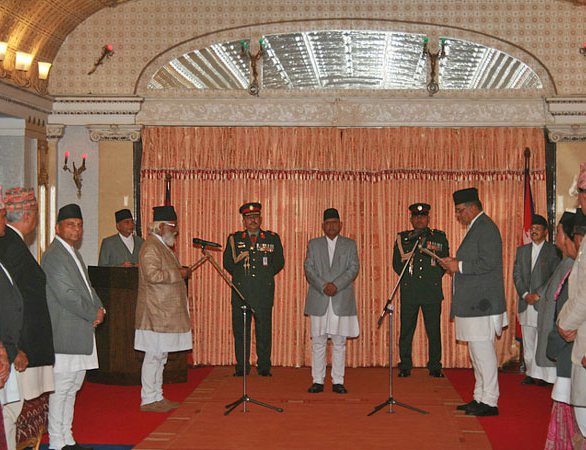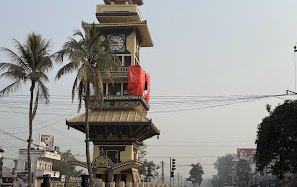
As the appointment row of former chief secretary Lok Man Singh Karki as chief of the Commission for the Investigation of the Abuse of Authority flares up, the Nepalese society, which is looking forward to the new elections, is bitterly divided. There is division among media, civil society and political parties over it.
President Dr. Ram Baran Yadav appointed Karki on Wednesday (May 8) morning following chairman of council of minister Khil Raj Regmi's clarification that the process of recommendation was made through constitutional and legal way.
On the other hand, from the street to the court and from the media to the entire political spectrum, the dominant agenda is not the forthcoming elections. Student unions affiliated to 13 different political parties have already announced an agitation. Nepali Congress leader Sushil Koirala and CPN-UML leaders, who recommended Karki’s name, have issued a statement asking president Yadav not to accept the recommendation. UCPN-Maoist leader Prachanda, however, is still sticking to his recommendation of Karki.
Former minister and member of the dissolved Constituent Assembly Nilamber Acharya writes in his face book wall, opposing the move as against the spirit. Even known royalist Dirgha Raj Prasai has opposed the appointment of Karki as the chief of the CIAA him terming corrupt. Leading civil society member and senior journalist Kanak Mani Dixit is leading the agitation against the appointment.
Although this new row seems somewhat strange, as a development arising with a new agitation, verbal war, or division, it is a regular feature of Nepalese society. One of the characters of Nepalese political and social spectrum is continuation of instability.
At a time when political parties are pressing to announce the elections date, the appointment row of former chief secretary Karki has overshadowed the process. If political parties continue to indulge in the appointment row, it will definitely hamper the election process.
“Nepali Congress and CPN-UML do not want to go for elections. This is the reason they are diverting their aim by denouncing the decision taken under their own consent,” said UCPN-Maoist leader Prachanda. “Actually, UML leaders proposed the name of Karki and all four political parties unanimously agreed on that.”
CPN-UML leaders dismissed the charges. “It was UCPN-Maoist leader Prachanda who proposed the name of Karki,” said CPN-UML leader Pradip Gyawali.
At a time when Nepal's major political parties are busy in launching a nationwide campaign, the political controversy has diverted their attention from elections to the appointment. Nepali Congress, CPN-UML and UCPN-Maoist leaders have already returned to capital from districts to clarify their stands.
Election Process
Disputes over the appointment are heating the streets of Kathmandu. The strike called by CPN-Maoist led front, representing 33 political parties, crippled the life in nine districts of eastern part of Nepal, thereby, disturbing the elections process.
Despite such disturbances, chief election commissioner Nilkatth Upreti is confident about holding the elections. "The election date will not go beyond mid-November. He also urged the people not to doubt the EC´s ability to conduct the polls," said Chief Election Commissioner Nilkantha Upreti “We are technically prepared to hold election so I also urge the parties to remain prepared for polls. UCPN-Maoist has proposed to the government to announce November 13 or 14 as the election date.”
Implications of the political disputes
The appointment row will have severe ramifications in the political process. It is likely to weaken all the institutions involved in the process. It will create a division among major four political parties, which will render the Four Party Political Mechanism defunct.
As workers of political parties have already raised a question about the capability of senior leaders, political parties will lose their legitimacy too. Bitterly divided political forces and civil society are likely to have impacts in the coming elections. The court's legitimacy will also suffer.
As the appointment row has already put the political forces in an odd situation, Nepal's politics will continue to go as it was. Although it may seem unnatural on the surface, the row is natural. Eminent constitutional lawyer Ganesh Raj Sharma, who is retired now, used to say that frequent political upheavals, unusual for common people, are a regular coincidence in Nepali politics. So, nothing is impossible in Nepal.

Keshab Poudel
Poudel is the editor of New Spotlight Magazine.
- ERC Nepal Is Focused On Expanding Distribution And Transmission To The Private Sector: ERC Chair Dr. Dhital
- Jul 06, 2025
- FOURTH PROFESSOR Y.N. KHANAL LECTURE: Nepal-China Relations
- Jun 23, 2025
- Colonel JP CROSS: Centenary Birthday
- Jun 23, 2025
- BEEN: Retrofitted For Green
- May 28, 2025
- GGGI has been promoting green growth in Nepal for a decade: Dr. Malle Fofana
- May 21, 2025















